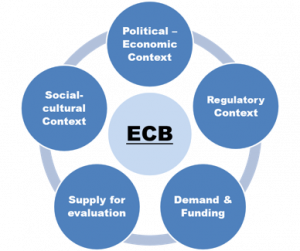We are closing out the OL-ECB TIG week by bringing back a blog with evergreen content that was so popular the first time around that we needed to give it another day in the sun. You can view part 2 of this original post here. We hope you enjoy.
My name is Scott Chaplowe and I currently work as the Director of Evidence, Measurement and Evaluation for climate at the Children’s Investment Fund Foundation (CIFF). As an evaluation professional, much of my work is not simply doing evaluation, but building the capacity of others to practice, manage, support and/or use evaluation. I’ve discovered I am not alone as other evaluation colleagues have echoed similar experiences with evaluation capacity development (ECB).
Hot Tips
Based on an expert lecture I gave on this topic at AEA2017, here are 5 considerations for building Evaluation capacity:
- Adopt a systemic (systems) approach to organizational evaluation capacity building (ECB). ECB does not happen in isolation, but is embedded in complex social systems. Each organization will be distinct in time and place, and ECB interventions should be tailored according to the unique configuration of different factors and actors that shape the supply and demand for ECB. Supply refers to the presence of evaluation capacity, (human and material), and demand refers to the incentives and motivations for evaluation use. The conceptual diagram below illustrates key considerations in an organizational ECB system.

- Plan, deliver and follow-up ECB with attention to transfer. If organizational ECB is to make a difference, it is not enough to ensure learning occurs; targeted learners need to apply their learning. As Hallie Preskill and Shanelle Boyle aptly express, “Unless people are willing and able to apply their evaluation knowledge, skills, and attitudes [“KSA”] toward effective evaluation practice, there is little chance for evaluation practice to be sustained,”
- Meaningfully engage stakeholders in the ECB process ECB will be more effective when it is done with rather than to organizational stakeholders. Meaningful engagement helps build ownership to sustain ECB implementation and use. It is especially important to identify and capitalize on ECB champions, and mitigate ECB adversaries who can block ECB and its uptake.
- Systematically approach organizational ECB, but remain flexible and adaptable to changing needs. ECB is intentional, and therefore it’s best orderly planned to gather information and analyze demand, needs and resources, identify objectives, and design a realistic strategy to achieve (and evaluate) ECB objectives.
However, a systematic approach does not mean a rigid blueprint that is blindly followed, which can inhibit experimentation to respond to changing capacity needs. ECB should remain flexible to adapt to the dynamic nature of the ECB system, which will vary and change over time and place.
- Align and pursue ECB with other organizational objectives. ECB should not be “silo-ed,” but ideally planned with careful attention to other organizational objectives and capacity building interventions. Consider how ECB activities complement, duplicate or compete with other capacity building activities.
Rad Resources
Read more about this top 10 list here, and you can view the AEA365 presentation. Also, check out the book, Monitoring and evaluation Training: A Systematic Approach, and this webpage has an assortment of resources to support evaluation learning and capacity building.
The American Evaluation Association is hosting Organizational Learning and Evaluation Capacity Building (OL-ECB) Topical Interest Group Week. The contributions all this week to AEA365 come from our OL-ECB TIG members. Do you have questions, concerns, kudos, or content to extend this AEA365 contribution? Please add them in the comments section for this post on the AEA365 webpage so that we may enrich our community of practice. Would you like to submit an AEA365 Tip? Please send a note of interest to AEA365@eval.org. AEA365 is sponsored by the American Evaluation Association and provides a Tip-a-Day by and for evaluators. The views and opinions expressed on the AEA365 blog are solely those of the original authors and other contributors. These views and opinions do not necessarily represent those of the American Evaluation Association, and/or any/all contributors to this site.
